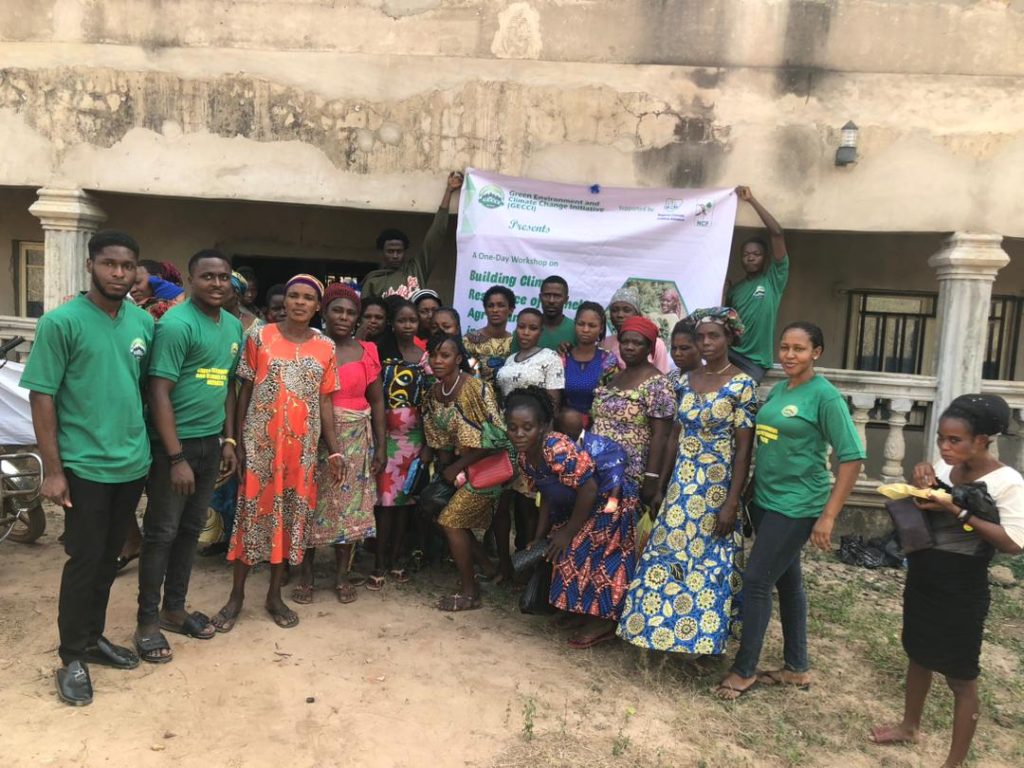Lawrence Nwimo, Awka
Environmental experts have recommended intentional tree planting as one of the major ways to mitigate climate change in Nigeria.
They stated this in Ebenebe, Awka North Local Government Area of Anambra State when a non-governmental organisation, Green Environment and Climate Change Initiative, (GECCI )took the campaign for Building Climate Resilience in agrarian communities to those in the rural communities of the state.
The event which was organised in partnership with the Forestry and Wildlife Department, Anambra state Ministry of Environment was supported by the Nigeria Climate Justice Alliance, ( NCJA), and the Nigeria Conservation Foundation, (NCF).
Climate change is one of the prevailing environmental problems in the world that has gained universal discussion in recent time because of its multiple effects.
These effects have also metamorphosed into some impacts such as the decline in agricultural activities, drought, migration, health problems, crises among farmers and herds men, flooding, erosion, hunger and poverty among others.
This, according to Dr. Oluropo Apalowo, the Program Officer of the Green Environment and Climate Change Initiative, GECCI, prompted them to take the campaign to the rural communities with the aim of ensuring that the effects do not consume local farmers who have been responsible for food security in Nigeria.
Apalowo who noted that Ebenebe was still among the communities that have forest reserves in Anambra State, said the idea was to teach the farmers new innovations that would help the farmers to mitigate the negative impacts of climate change on their agricultural produce.
According to him, the Non-Governmental Organisation had embarked on series of programmes on climate change including educating secondary school students and undergraduates of Tertiary Institutions on how to be friendly to the environment by planting trees as well as taking the message to rural farmers in various communities.
The Director, Forestry and Wildlife Department, Anambra State Ministry of Environment, Dr. Onyinye Achugamuonye called on the people to imbibe Climate Resilience which is the ability to anticipate, prepare, respond and recover from the adverse effect of climate change.
She noted that the effects of climate change on agrarian community are diverse and multifaceted which include, shift in growing seasons, water scarcity, increased temperatures, extreme weather events, pest and diseases, crop yield variability, livelihood challenges, loss of biodiversity, adaptation costs as well as social and cultural impacts.
According to the environmental expert, the climate resilience challenges could be approached through Building adaptive capacity, Implementing sustainable practices, Fostering community engagement to mitigate the effects of climate change, Policy development and Ecosystem protection by both the people and government.
Another expert and, forest officer incharge of Awka Zone, Mr Innocent Eze, posited that tree planting is key to checkmating climate issues as it controls erosion and provides shelter as well as resilience to other dangers.
Mr Eze who admitted that there were still few existing forest reserves in the state however regretted that successive governments have not really given proper attention to developing more reserves rather they continue to embark on selling known ones for reasons unrelated to the original ideas.
“We are trying our best to conserve the forest but politicians are not making it easy for us because most of the lands have been sold out. For example, Mamu forest reserve, they are still selling the land, clearing the trees and a lot of letters have been written to the government to know whether they will stop but its still going on.’’
On his part, a lecturer at Nnamdi Azikiwe University, Awka and Director Bamboo institute, Doctor John Ogbodo, noted that the impacts of climate change have been enormous including poor yield of agricultural productivity, flooding and outbreaks both to the human and crops hence the need for concerted effort to mitigate it.
Ogbodo, therefore, motivated the people to form environmental committees relating it to agro forestry, so that they can carry out some environmental activities such as tree planting, practicing of agro forestry, cultivation of crops in their climate smart way using minimal soil, and by doing composite manure at their backyard before taking it to the farm.
A farmer, Mrs Edit Obiora appreciate GEECI, for taking time to educate them on how to mitigate climate change but however called on government to provide them with soft loans to enable them apply the experiences garnered from the experts.
She observed that there have been obvious changes on crop yields in some seasons showing that the feared impact was already affecting local farmers irrespective of location.

